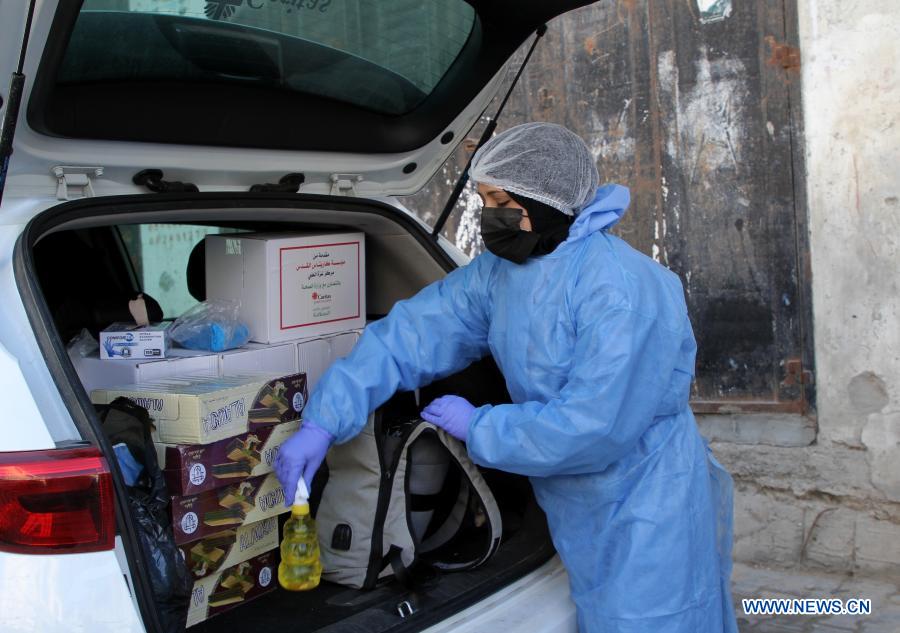
A medical worker stands near a mobile clinic as she arrives to check patients infected with COVID-19, in Gaza City, on Jan. 21, 2021. Seven mobile clinics have been established in the Gaza Strip to treat coronavirus cases and ease the burden on the Hamas-run Health Ministry.(Photo by Rizek Abdeljawad/Xinhua)
by Sanaa Kamal
GAZA, Jan. 25 (Xinhua) -- Seven mobile clinics have been established in the Gaza Strip to treat coronavirus cases and ease the burden on the Hamas-run Health Ministry.
Hussam al-Safady, a project coordinator at the non-government Caritas Foundation that set up the clinics, said that each mobile clinic has a doctor, a nurse and a driver, whose responsibilities are to visit patients' homes, follow up on their health conditions, and provide them with medicine and necessary equipment.
The Caritas Foundation, an international medical institution designed to deal with marginalized patients in critical times, has decided to establish mobile clinics in the coastal enclave to provide ordinary Palestinians with medical assistance they needed, since the Gaza health authority declared its first two cases of the virus in March 2020, according to al-Safady.
"At that time, we helped tens of thousands of patients to get their medicines and helped them avoid being infected with the novel virus," he said.
Despite the good intentions and the great work, the virus did not stop spreading. At the end of August 2020, the Hamas-run Interior Ministry imposed a series of preventive and precautionary measures to curb the spread of the pandemic.
The situation got worse, especially amid the lack of medical equipment in the Gaza Strip, said al-Safady.
"This is the reason why we suggested helping the Health Ministry by following up on the patients as well as those who required home quarantine," he added.
So far, the medical staff has dealt with about 20,000 cases, including patients and their contacts.
Raed Kuhail, a local internist from Gaza, joined the mobile clinics four months ago, as he saw that the health situation kept deteriorating.
The 36-year-old father of three told Xinhua that the rapid spread of the virus among people has "confused" the health system, forcing the clinics to impose home quarantine on the infected people who did not suffer from chronic diseases.
The internist said that he and his colleagues in other mobile clinics used to visit about 40 to 70 cases in all governorates in the Gaza Strip.
Hedaya Mohammed, a local nurse in her 30s, said that she was happy to take her place in a mobile clinic to help other people.
The coastal enclave has been suffering from limited health services, especially after the enclave was put under a tight Israeli blockade in 2007, when Hamas took control of the strip, she said.
"In Gaza, we do not have a modern health system, which may expose all of us to infection with the virus," the young nurse said while wearing her protective suit in front of a local house to follow up on an infection.
Samira al-Naaizy, a 52-year-old mother of eight from the Gaza city, was infected with the virus. She said that the mobile clinics helped her and other patients to get treatment in the comforts of their homes.
Ibrahim Nassar is another patient infected with the virus from the Khan Younis city in the southern Gaza Strip. He said that the medical staff treated him and four members of his family in the mobile clinics.
The 35-year-old father of two praised the mobile clinics' medical services, saying that "the crisis pushed all people to bear their roles toward each other to overcome the critical time." Enditem




